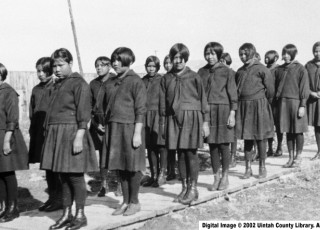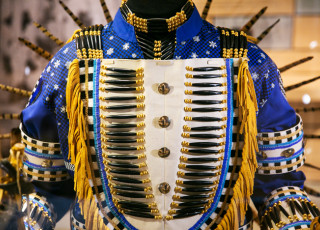NHMU Commemorates National Day for Truth and Reconciliation
Event to underscore intergenerational impacts of American Indian Residential schools
SALT LAKE CITY, September 7, 2024 – The Natural History Museum of Utah (NHMU) will host a public event on September 28, 2024, from 11 a.m. to 1:30 p.m. to honor victims of the American Indian Residential School system. The event aims to raise awareness of the impacts inflicted on generations of individuals, families, and communities by the schools, including many here in Utah.
The National Day for Truth and Reconciliation, formally recognized on a federal level in Canada on September 30, is a day dedicated to honoring Indigenous survivors and the children who never returned home from Canadian Indian residential schools. It also acknowledges the families and communities affected by the policy of forced assimilation. While there is no formally recognized day of commemoration in the United States, there is a growing movement to acknowledge and raise awareness of the damage done by American Indian boarding schools to promote reconciliation.
From 1869 to the 1960s, hundreds of thousands of Native American children were removed from their homes and placed in boarding schools run by the federal government and other public entities. These institutions aimed to dismantle Native cultures and communities by assimilation, stripping students of traditional clothing, hair, and other cultural symbols and practices. Students at the schools were often subjected to physical, sexual, cultural, and spiritual abuse. Often overcrowded and poorly maintained, the schools also lacked adequate healthcare, and many students succumbed to illnesses like tuberculosis and influenza.
In recent years, efforts have been made to recover the remains of deceased and missing students, with Indigenous communities, historians, and archeologists working together to locate unmarked graves and identify those who never returned home. These efforts aim to provide closure to families and honor the memory of those who suffered in these schools. However, public understanding of this trauma still deficient.
“The public acknowledgment of this painful history and its ongoing repercussions is critical to advancing reconciliation,” said Dr. Jason Cryan, the Sarah B. George Executive Director of the Natural History Museum of Utah. “It is essential that we honor the survivors, their families, and those who never returned, while supporting the collective healing journey. Only through recognition and reflection can true reconciliation and understanding be achieved.”
To shed light on this troubled history, its ongoing impact, and efforts to recover the deceased, NHMU’s event will offer a powerful learning opportunity to guests wishing to know more. The event will present a screening of the short film Remember the Children followed by a panel discussion moderated by Dena Ned, of the University of Utah College of Social Work and director of the Indigenous Social Work Scholars Program, and featuring other Native American elders and experts.
In solidarity with the National Day for Truth and Reconciliation, attendees are encouraged to wear orange shirts, which symbolize the stripping away of culture, freedom, and self-esteem experienced by Indigenous children. Official Orange Shirt Day pins will also be available for purchase, with $2 from each pin benefiting the Orange Shirt Society.
NHMU offers enrolled members of Tribal Nations year-round free admission to the museum, including children in their household. Tribal members can also request to view or research anthropology collections that are not currently on exhibit.
For more information about the commemoration event and NHMU's initiatives, please visit nhmu.utah.edu/truth.
Interview Opportunities
Dena Ned
Dena Ned is an Associate Professor/Lecturer at the University of Utah College of Social Work. Her research has focused on the Indian Child Welfare Act, Title V of the Indian Health Care Improvement Act, urban American-Indian health policies and delivery of care systems, as well as social determinants of health in native communities.
Meg Singer
Meg joined NABS in October 2023 as the Director of Community Impact. Meg is a descendant of boarding school survivors with her father, who attended Tuba City Boarding School in Tuba City, AZ, and her grandmother, who attended Sherman Institute in Riverside, CA. Meg has been an advocate for tribal sovereignty, language revitalization, literacy, & STEM x Culture curriculum in the classroom. Prior to joining NABS, Meg establishedthe Indigenous Justice Program for the ACLU of Montana and most recently served as Program Director for the Native American Initiative at Utah Valley University.
Forrest Cuch
Forrest S. Cuch is an enrolled member of the Ute Indian Tribe. He was born and raised on the Uintah and Ouray Ute Indian Reservation in northeastern Utah. He has a Bachelor of Arts Degree in the Behavioral Sciences from Westminster College. Forrest has held many challenging jobs during his 38-year career having worked for several Indian tribes in various capacities to serving as director for Utah Division of Indian Affairs. He published, A History of Utah’s American Indians, Utah State University Press, 2000. Forrest played a key role in the PBS/KUED sponsored curriculum project entitled; We Shall Remain, which features a video series of the histories of the Utah tribes with accompanying materials. Currently retired, he provides lectures on healing trauma, Native American History, and conservation. In 2022, he was appointed to Jane Goodall’s Legacy Foundation. He also recently co-authored a book entitled, A Native Way of Giving, 2022, Episcopal Church Publishing.
Stephanie Benally
Ms. Stephanie Benally is a citizen of the Diné Nation. Her clans are Red Streak People born for Bitter Water, her maternal grandfather is Mexican People clan, and paternal grandfather is Red House. She grew up in the Salt Lake Valley with her parents Howard and Beverly Benally and her four siblings. Stephanie is the Native American Specialist at Utah Foster Care. Ms. Benally works daily to educate state child welfare workers, judges, attorneys and guardian ad litems on the importance of placing Native American children in kinship and Native foster care placements. Ms. Benally led the development of Utah’s first statewide Native American foster care recruitment and retention
plan. Stephanie has been nationally and locally recognized for her work in child welfare. She is a long-standing member of the National Indian Child Welfare Association (NICWA). Currently she is a Board of Director with Utah Tribal Relief Foundation, Board of Director with Voices for Utah Children, member of the National Native American Boarding School Healing Coalition, and volunteer with Navajo Voters office.
###
About the Natural History Museum of Utah
The Natural History Museum of Utah is one of the leading scientific research and cultural institutions in the country. Established in 1963, the museum’s 10 permanent exhibitions are anchored by its state-of-the-art collections and research facilities containing almost 2 million objects. These collections are used in studies on geological, biological, and cultural diversity, and the history of living systems and human cultures within the Utah region. The museum hosts approximately 300,000 general visitors a year and provides one of the most spectacular private event settings in the Salt Lake City area. NHMU also broadens the reach of its mission through a variety of science-based outreach programs to communities and schools throughout Utah, reaching every school district in the state every other year.
Download Media
-

Boys lined up in front of Whiterocks Indian School in their uniforms Digital image, copyright 2003 Uintah County Library
-

Whiterocks Boarding School, Ute children in classroom. Digital Image, copyright 2022 Uintah County Regional History Center
-

Female students at Whiterocks Boarding School (Uintah County) for Native Americans. Two rows of young girls with cropped hair dressed in uniforms. Digital image, copyright 2002 Uintah County Library
Press contacts and links
Press Links


